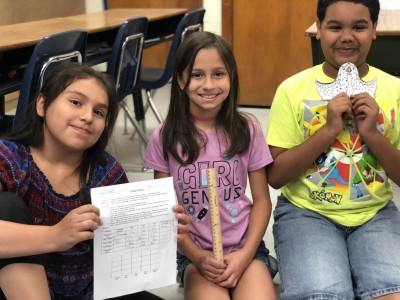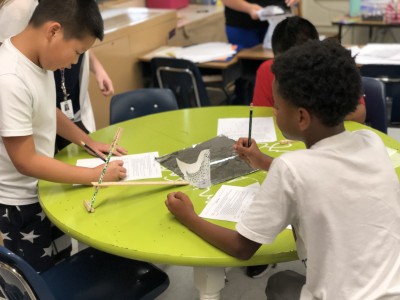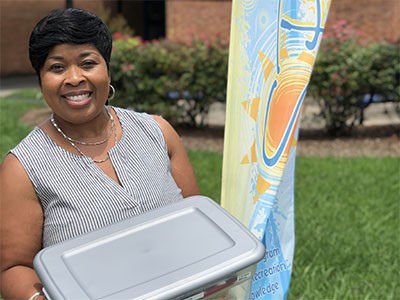Jefferson Lab reaffirms their commitment to the SPARK program in order to combat students' summer slide during the warmer months
NEWPORT NEWS, VA – “Hiiiiiiii, Ms. Rhonda!” a group of enthusiastic rising-fifth-graders chorused as Rhonda Bell, a Jefferson Lab Science Education administrator, walked into the classroom. The students were excited because the day before, Bell led an interactive science, technology, engineering and mathematics-influenced activity as part of the Summer Program for Arts, Recreation and Knowledge for the city of Newport News. “We’re taking it back to the science you learned in your third grade SOL’s [Standards of Learning],” Bell exclaimed as students eagerly observed the materials for the day’s project.
SPARK brings local community groups together to fight summer slide, a term coined to describe the regression students experience during the summer months when they are not in school. The Department of Energy's Thomas Jefferson National Accelerator Facility, along with 14 other local organizations, businesses, museums, nonprofits and city agencies, participate in SPARK. The program spans a two-month period throughout the city of Newport News.
Jefferson Lab has participated since the programs’ inception five years ago. According to Bell, SPARK increases in popularity every year. Additionally, SPARK is free for students; Newport News schools only need to sign up to participate. Jefferson Lab’s Science Education department regularly hosts and travels to locations across Hampton Roads promoting STEM-related activities yearlong. The lab’s engagement in SPARK reaffirms the lab’s commitment as a community partner to the city.
This particular SPARK activity, aptly named Dragon Racer, tested the speed of a paper dragon down a student-engineered ramp. As students excitedly test out assorted ramp surfaces using wax paper, aluminum and sand paper, they had several observations.
“The wax paper slide was the best because the dragon went really fast!“ one student said. Another student remarked that they liked predicting which ramp was going to make the dragon fly the fastest.
“Taking part in SPARK makes summer learning fun. We want students to remember these moments. If they remembered the activities they learned fondly, then it made a positive impact on them. And if it made a positive impact, we’ve hopefully inspired the next scientist, teacher or engineer,” Bell says.
As the lesson wrapped up, Bell broke the news that she would not be returning to this classroom the following day as she had to move to another grade. Collective sighs were heard throughout the room but Bell ended on a high note: “I think we have some budding scientists in here,” she said. “Keep learning and keep having fun.”
“Learning doesn’t stop,” Bell said of the program. “So, our commitment to these students doesn’t stop. Jefferson Lab will be here for students all year long.” To learn more about other Jefferson Lab STEM initiatives, including Physics Fest, Frostbite Theater and the SOL practice tests, visit education.jlab.org.
Contact: Rebecca Duckett, Communications Office, (757) 269-6809, duckett@jlab.org




